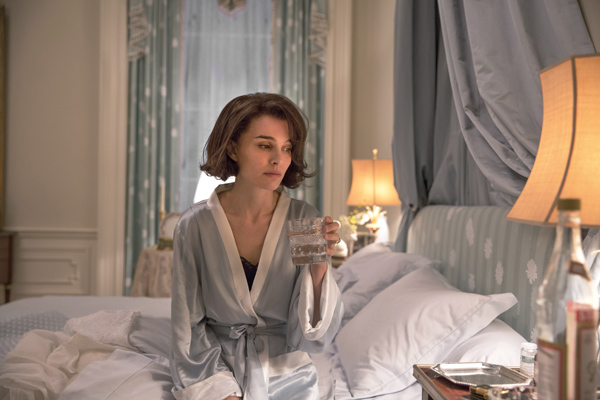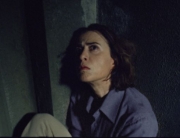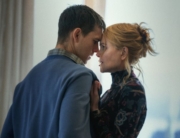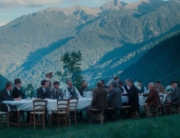This vibrant and melancholic film joins a mini-trend of looking behind the curtain at the rich and famous. Usually the person in question is royalty—and British. Netflix’s deluxe peephole-look into the House of Windsor in The Crown provides enough fodder for the viewer-as-analyst. Ten years ago, The Crown’s creator, Peter Morgan, filled in the blanks regarding Queen Elizabeth’s reaction to the death of Diana, Princess of Wales, in The Queen. The screenwriter of Jackie, Noah Oppenheim, likewise focuses on a number of days between the assassination of President John F. Kennedy and his funeral three days later, all from the point of view of Jacqueline Bouvier Kennedy, aka Jackie, in order to distill her life.
From the moment that the film begins, tension builds, wanes only temporarily, and resurges. Like the best biopics, the filmmakers take only a slice to build the whole—and in a dense 100 minutes, too. The events of November 22, 1963, have been depicted on-screen numerous times, from 2013’s Parkland (an overview of that weekend) to Oliver Stone’s infamous conspiracy theory-fest JFK, which was all about the president’s death. In Jackie, his passing looms large, but the focus is on the living. Just in terms of dramaturgy, it’s a wonder that the unfolding events haven’t before been so closely examined in a feature film, with his widow at the center.
Screenwriter Noah Oppenheim mines the historical record for all its worth, creating a central role rich with contradictions that deconstructs her public image. On the surface, there’s the soften-spoken “debutante,” as she mockingly refers to herself, with her singular speech pattern, and privately the blunt, strong-arming tactician. Presumably, this no-hold-barred Jackie is based on her seven-hour interview with Arthur M. Schlesinger Jr. in 1964.
The entire film is told as though seen from a prism, approaching its subject through different angles. An interview with a journalist (a stand-in for writer Theodore H. White and played by a grim and unflappable Billy Crudup) takes place at the Kennedy estate at Hyannis Port one week after the assassination, and forms the plot’s framework. With just the two of them in the mansion, she lays down the non-negotiable ground rules of what will be published, and in a game of cat and mouse, she dangles morsels of confessions and headline-making scoops, only to deny that she ever made the statements.
The writer wants the historical record; she, however, intends this rare exclusive to lay the foundation for the legacy of her husband’s incomplete term of office. Their interactions, from the candid to the curt, smoothly weave in historical context, especially for a biopic. She realizes people, especially men, underestimate her, and she clearly takes some pleasure in contradicting them.
A jittery time line jumps back and forth from the nightmarish cavalcade of events, comprised of scenes of short shocks: Jackie as a stunned eyewitness and, alternatively, a deft manager of the media. (She did, after all, have a career as a reporter.) An additional subplot—a reenactment of the widely watched A Tour of the White House with Mrs. John F. Kennedy, which aired in 1962—reminds viewers of the first lady as TV star. From the sidelines, her secretary, Nancy Tuckerman (Greta Gerwig), reminds her to smile, and the first lady remains gracious even when interrupted by newsman Charles Collingwood. Overall, the film is a departure from the starkness and leisurely pace of director Pablo Larraín’s other films (such as The Club), and marks the first time a woman takes top billing.
Ultimately, the film creates a Janus-like Jackie, who looks to the past in recounting her husband’s death but who also fixes her focus on the future, making sure her husband won’t be a forgotten historical footnote. The movie offers up abundant scenes of high glamour, as well as Jackie on a boozy, chain-smoking, pill-popping bender, with Richard Burton’s crooning rendition of “Camelot” blaring from the turntable, during her first night alone in the White House.
As in The Crown, no expense was seemingly spared. (It was filmed mainly in Paris with a reported budget of nine million.) Fittingly for its subject, and despite the inherent violence, Oppenheim and director Larraín’s vision is elegant, enhanced by the orchestration of Mica Levi’s shape-shifting and undulating score, the Chanel wardrobe, the gold-and-white simplicity of the re-created East Room, and especially Natalie Portman’s nuanced, gutsy, and immersive performance. Resistance to Portman playing one of the most famous women of the 20th century will dissolve. And among the strong supporting cast, Beth Grant’s Lady Bird Johnson hints at another movie with a whole other agenda. (Now if only this were a Netflix series.)







Leave A Comment